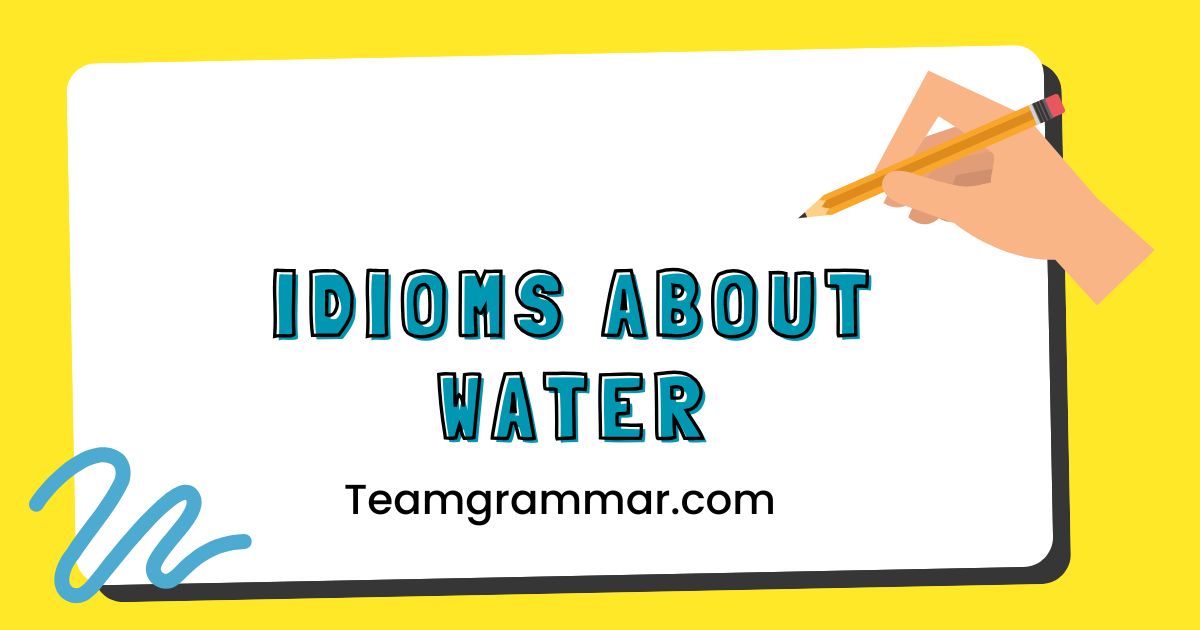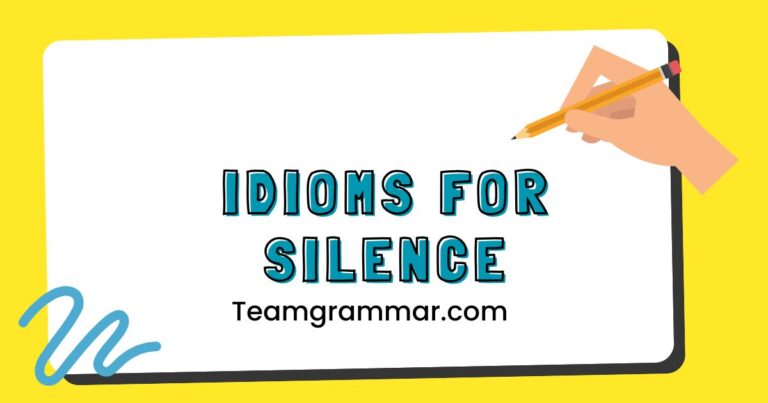27 Dive Deep: Mastering English Idioms About Water
Idioms are colorful expressions that add depth and nuance to the English language. Understanding idioms, especially those related to common themes like water, is crucial for both comprehending native speakers and enriching your own communication.
Water idioms often reflect the essential and powerful nature of water itself, symbolizing emotions, situations, and experiences. This article provides a comprehensive guide to water idioms, exploring their meanings, origins, and proper usage.
This guide is designed for English language learners of all levels, from beginners seeking to expand their vocabulary to advanced speakers aiming to refine their understanding of idiomatic expressions.
Table of Contents
- Introduction
- What are Water Idioms?
- Structural Breakdown of Water Idioms
- Types and Categories of Water Idioms
- Examples of Water Idioms
- Usage Rules for Water Idioms
- Common Mistakes with Water Idioms
- Practice Exercises
- Advanced Topics in Water Idioms
- Frequently Asked Questions
- Conclusion
Introduction
English idioms are figurative expressions where the overall meaning differs from the literal meaning of the individual words. They add color, depth, and cultural context to communication.
Mastering idioms, especially those related to water, is essential for understanding native speakers and enriching your own language skills. Water idioms are particularly interesting because they often draw on the fundamental importance of water in life, reflecting its power, fluidity, and necessity.
This article aims to provide a comprehensive guide to understanding and using water idioms effectively.
This guide is designed for English language learners of all levels, from beginners to advanced speakers. Beginners will find clear explanations and numerous examples to help them grasp the basic meanings and usages of common water idioms.
Advanced learners can delve into the nuances of these expressions, exploring their origins and subtle differences in meaning. By the end of this article, you will have a solid understanding of water idioms and be able to use them confidently in your own speaking and writing.
What are Water Idioms?
Water idioms are phrases or expressions in the English language that use water-related terms to convey a figurative meaning. These idioms often symbolize emotions, situations, or experiences that are not literally related to water itself.
The power of water idioms lies in their ability to evoke vivid imagery and add layers of meaning to communication. Understanding these idioms requires looking beyond the literal definitions of the words and grasping the underlying concept or idea they represent.
The function of water idioms is to add color, emphasis, and cultural context to language. They can be used to describe a wide range of situations, from emotional states to levels of difficulty.
For example, the idiom “in deep water” doesn’t literally mean someone is submerged in water; it means they are in a difficult or problematic situation. Similarly, “make waves” doesn’t refer to creating ripples in a body of water; it means to cause trouble or disruption.
Idioms exist in every language, and they often reflect the cultural values and experiences of the people who speak that language. In English, water idioms are particularly common due to the historical importance of water for transportation, agriculture, and survival.
Water idioms can be classified based on the specific concepts they represent. Some idioms relate to emotions, such as “a sea of emotions,” which describes an overwhelming feeling.
Others relate to challenges or difficulties, like “in over your head,” meaning someone is dealing with a situation beyond their capabilities. Still others relate to truth and honesty, where “muddy the waters” means to obscure the truth or make a situation confusing.
Understanding these classifications can help you better interpret and use water idioms in various contexts.
Structural Breakdown of Water Idioms
The structure of water idioms varies depending on the specific phrase. However, most water idioms consist of a combination of water-related nouns (e.g., water, sea, ocean, river) and verbs or adjectives that contribute to the figurative meaning.
Analyzing the structural components of water idioms can help in understanding how their meanings are derived.
Many water idioms follow a subject-verb-object structure, where the subject is often a person or situation, the verb describes an action related to water, and the object is the consequence or result. For example, in the idiom “pour oil on troubled waters,” the subject is implied (someone), the verb is “pour,” the object is “oil,” and “troubled waters” describes the situation.
This structure suggests that someone is taking action to calm or resolve a difficult situation. Other idioms may use prepositional phrases to add context or detail, such as “in deep water,” where “in” is a preposition and “deep water” describes the state of being in trouble.
Understanding the grammatical structure of idioms is not always necessary for using them correctly, but it can be helpful in remembering their meanings and applying them appropriately. By recognizing the different parts of speech and how they interact, you can better grasp the figurative meaning of the idiom and use it in a way that is both grammatically correct and contextually appropriate.
Pay attention to the specific words used in each idiom and how they relate to each other. This will help you to understand the underlying metaphor and use the idiom effectively in your own communication.
Types and Categories of Water Idioms
Water idioms can be categorized based on the themes or concepts they represent. Here are some common categories:
Emotional States
These idioms describe feelings and emotions using water imagery. Examples include “a sea of emotions,” “moved to tears,” and “pour your heart out.”
Difficulty and Trouble
These idioms refer to challenging or problematic situations. Examples include “in deep water,” “in over your head,” and “troubled waters.”
Life and Existence
These idioms relate to the journey of life and the experiences we encounter. Examples include “go with the flow,” “make a splash,” and “still waters run deep.”
Truth and Honesty
These idioms describe situations where honesty is involved or where the truth is obscured. Examples include “muddy the waters,” “clear as mud,” and “test the waters.”
Effort and Achievement
These idioms talk about how much effort you put into something or how well you achieve the task. Examples include “water under the bridge”, “swim against the tide”, and “sink or swim”.
Examples of Water Idioms
This section provides a comprehensive list of water idioms, organized by category, with detailed explanations and examples.
Idioms Related to Emotion
Water idioms often capture the intensity and fluidity of human emotions. These expressions use water imagery to convey feelings of happiness, sadness, anger, and more.
The following table lists several idioms related to emotion.
| Idiom | Meaning | Example Sentence |
|---|---|---|
| A sea of emotions | Overwhelmed by strong feelings | After the tragic news, she was lost in a sea of emotions. |
| Moved to tears | Deeply touched or saddened | The touching story of the rescued dog moved everyone to tears. |
| Pour your heart out | Express your feelings openly and honestly | She poured her heart out to her best friend about her relationship problems. |
| Bawl your eyes out | To cry uncontrollably for a long time | She bawled her eyes out when she heard the sad news. |
| Cry me a river | Used to express disbelief or lack of sympathy for someone’s complaints | He’s complaining about having to work overtime again? Cry me a river. |
| In floods of tears | Crying a lot | She was in floods of tears after failing her driving test. |
| Reduced to tears | Made to cry | The harsh criticism reduced her to tears. |
| Emotional floodgates | The sudden and overwhelming release of suppressed emotions | Hearing that song opened the emotional floodgates, and she began to cry. |
| Still waters run deep | A quiet or reserved person may have intense emotions or hidden depths | He doesn’t say much, but still waters run deep; he’s very insightful. |
| On an even keel | In a stable and balanced emotional state | After a few weeks, she managed to get her life back on an even keel. |
| All at sea | Confused or not knowing what to do | I’m all at sea with these new instructions; can you help me? |
| Make someone’s mouth water | To cause someone to have a strong desire for something, especially food | The smell of freshly baked bread made my mouth water. |
| Go overboard | To do something excessively or to an extreme degree | He went overboard with the decorations for the party. |
| Wash away | To cause something to disappear as if by water | Time can wash away even the deepest wounds. |
| Be washed up | To be no longer successful or effective | After a series of failures, he felt washed up in his career. |
| Have a whale of a time | To have a very enjoyable or exciting experience | We had a whale of a time at the beach yesterday. |
| A drop in the ocean | A very small amount compared to what is needed | The money we raised is just a drop in the ocean compared to the total cost. |
| In deep thought | Engaged in serious and profound thinking | She was sitting by the window, lost in deep thought. |
| Out of your depth | In a situation that you cannot deal with | He was out of his depth in the advanced math class. |
| Take the plunge | To decide to do something important or risky after hesitating | They finally decided to take the plunge and buy a house. |
| Waterlogged | To be soaked or saturated with water, often to the point of being heavy or damaged | The field was waterlogged after the heavy rain. |
| Drowning in something | To be overwhelmed by a large amount of something, such as work or debt | I’m drowning in paperwork at the office. |
| Swim in something | To have a lot of something | They are swimming in money after a successful business. |
| Make a splash | To attract a lot of attention or become very successful in a short time | Her debut novel made quite a splash in the literary world. |
| Dead in the water | Unable to proceed or make progress | The project is dead in the water due to lack of funding. |
| Like water off a duck’s back | Having no effect on someone | Criticism rolls off him like water off a duck’s back. |
Idioms Related to Difficulty and Trouble
These idioms use water imagery to describe situations that are challenging, problematic, or difficult to navigate. They often convey a sense of being overwhelmed or in a precarious position.
The following table lists several idioms related to difficulty and trouble.
| Idiom | Meaning | Example Sentence |
|---|---|---|
| In deep water | In a difficult or problematic situation | He found himself in deep water after making a bad investment. |
| In over your head | Dealing with a situation beyond your capabilities | She was in over her head when she volunteered to manage the project. |
| Troubled waters | A situation full of difficulties or problems | The company is navigating troubled waters due to the economic downturn. |
| Adrift at sea | Feeling lost, without direction, or unsure of what to do | After losing his job, he felt adrift at sea, unsure of his next steps. |
| Run into rough seas | Encountering difficulties or challenges | The business ran into rough seas when a major client pulled out. |
| Rock the boat | To cause trouble or disrupt a stable situation | He didn’t want to rock the boat by disagreeing with the boss. |
| Sink or swim | To succeed or fail entirely on your own efforts | The new employees were thrown into the job and had to sink or swim. |
| Keep your head above water | To manage to survive or cope with a difficult situation | He was struggling to keep his head above water financially. |
| Make heavy weather of something | To make something seem more difficult than it really is | She made heavy weather of a simple task. |
| Be all at sea | To be confused or uncertain about something | I’m all at sea with these new computer programs. |
| Stem the tide | To stop something from increasing or spreading | The government is trying to stem the tide of unemployment. |
| Against the tide | In opposition to the general trend or opinion | He was swimming against the tide when he argued for change. |
| Be in the same boat | To be in the same difficult situation as someone else | We’re all in the same boat when it comes to the new budget cuts. |
| A sea change | A significant or dramatic transformation | The internet has brought about a sea change in the way we communicate. |
| Churn the water | Creating commotion or disturbance | The politician’s remarks churned the water and caused controversy. |
| Have a sinking feeling | A feeling that something bad is going to happen | I had a sinking feeling when I saw the ambulance outside my house. |
| Go down the drain | To be wasted or lost | All our efforts went down the drain when the project was cancelled. |
| In hot water | In trouble | He’s in hot water with his boss for being late again. |
| Walk on water | Seemingly doing the impossible or performing miracles | The new CEO is so successful that people say he can walk on water. |
| Flood the market | To supply a market with an excessive amount of a product | Cheap imports are flooding the market, hurting local businesses. |
| Sweat blood | To work extremely hard and make a great effort | We sweated blood to finish the project on time. |
| Test the waters | To try something out before committing to it fully | We decided to test the waters before launching the new product. |
| Run dry | To be used up or exhausted | After weeks of hard work, her energy finally ran dry. |
| Go with the flow | To accept things as they happen and adapt to circumstances | Sometimes it’s best to just go with the flow and see what happens. |
| Turn the tide | To reverse a negative trend or situation | The new strategy helped to turn the tide and improve sales. |
| A watershed moment | A turning point or significant event that changes the course of things | The election was a watershed moment in the country’s history. |
Idioms Related to Life and Existence
These idioms use water as a metaphor for the journey of life, change, and the experiences we encounter along the way. They often reflect the dynamic and ever-changing nature of existence.
The following table lists several idioms related to life and existence.
| Idiom | Meaning | Example Sentence |
|---|---|---|
| Go with the flow | To accept things as they happen and adapt to circumstances | Sometimes it’s easier to just go with the flow and not resist change. |
| Make a splash | To attract a lot of attention or become very successful quickly | The new artist made a splash with her innovative paintings. |
| Still waters run deep | A quiet or reserved person may have intense emotions or hidden depths | He doesn’t say much, but still waters run deep; he’s a very thoughtful person. |
| Water under the bridge | Past events that are no longer important or relevant | That argument is water under the bridge; let’s move on. |
| A drop in the bucket | A very small amount compared to what is needed | The donation was just a drop in the bucket compared to the total cost. |
| Dead in the water | Unable to proceed or make progress | The project is dead in the water due to lack of funding. |
| Like water off a duck’s back | Having no effect on someone | Criticism rolls off him like water off a duck’s back. |
| A sea of faces | A large crowd of people | He looked out at a sea of faces during his graduation speech. |
| Turn the tide | To reverse a negative trend or situation | The new strategy helped to turn the tide and improve sales. |
| A watershed moment | A turning point or significant event that changes the course of things | The election was a watershed moment in the country’s history. |
| Keep afloat | To survive financially | They struggled to keep their business afloat during the recession. |
| Fish out of water | Feeling uncomfortable or out of place in a new environment | He felt like a fish out of water at the fancy party. |
| Clear the air | To resolve a misunderstanding or disagreement | They had a long talk to clear the air after the argument. |
| Wash your hands of something | To disclaim responsibility for something | He washed his hands of the project after the problems arose. |
| Throw someone in at the deep end | To give someone a difficult task without preparation | The new intern was thrown in at the deep end and had to learn quickly. |
| Blood is thicker than water | Family relationships are stronger than other relationships | Despite their disagreements, blood is thicker than water, and they always support each other. |
| Pour cold water on something | To discourage or disapprove of something | He poured cold water on my plans for a vacation. |
| Drift apart | To gradually become less close or intimate | Over the years, they drifted apart due to different interests. |
| Go swimmingly | To proceed smoothly and without problems | The meeting went swimmingly, and we reached an agreement quickly. |
| The calm before the storm | A period of peace and quiet before a time of trouble or chaos | The quiet morning was just the calm before the storm of a busy day. |
| Treading water | To be in a situation where you are making no progress | The company is just treading water, not growing or improving. |
| Cut your losses | To stop doing something that is failing in order to minimize losses | We decided to cut our losses and sell the failing business. |
| A rising tide lifts all boats | When an economy is doing well, everyone benefits | The economic boom has shown that a rising tide lifts all boats. |
| Liquid assets | Cash or easily convertible assets | The company has plenty of liquid assets to cover its debts. |
| Smooth sailing | Easy and without problems | After the initial challenges, it was smooth sailing for the rest of the project. |
| High and dry | In a helpless or abandoned situation | They left me high and dry when they cancelled the contract. |
Idioms Related to Truth and Honesty
These idioms use water imagery to describe situations where truth is either revealed, obscured, or questioned. They often relate to clarity, deception, and the search for understanding.
The following table lists several idioms related to truth and honesty.
| Idiom | Meaning | Example Sentence |
|---|---|---|
| Muddy the waters | To make a situation confusing or unclear | The new information only served to muddy the waters further. |
| Clear as mud | Not clear at all; difficult to understand | The instructions were as clear as mud; I couldn’t understand them. |
| Test the waters | To try something out before committing to it fully | We decided to test the waters before launching the new product. |
| Wash your hands of something | To disclaim responsibility for something | He washed his hands of the project after the problems arose. |
| Pour cold water on something | To discourage or disapprove of something | He poured cold water on my plans for a vacation. |
| Clear the air | To resolve a misunderstanding or disagreement | They had a long talk to clear the air after the argument. |
| Under the water | Hidden or concealed | The truth about the scandal was kept under the water. |
| In the wake of | Following or as a result of something | In the wake of the hurricane, many people lost their homes. |
| Fishy | Suspicious or questionable | There’s something fishy about his explanation. |
| Run deep | To be profound or deeply rooted | Their feelings for each other run deep. |
| Go to the well one too many times | To rely on something too often, to the point where it is no longer effective | The comedian went to the well one too many times with the same jokes. |
| Water down | To make something weaker or less forceful | The company watered down the proposal to make it more acceptable. |
| Full of hot air | Talking a lot but not saying anything meaningful | The politician’s speech was full of hot air. |
| Mud slinging | Making malicious and often untrue attacks | The political campaign turned into a mud slinging contest. |
| Come clean | To confess or admit something, especially something that has been hidden | He decided to come clean and tell the truth about what happened. |
| All washed up | No longer successful or effective | After a series of failures, he felt all washed up. |
| Get your feet wet | To begin or become involved in something new | She wanted to get her feet wet in the business world. |
| Have a good innings | To have a long and successful life or career | He had a good innings and lived to be 90 years old. |
| Oil on troubled waters | Something that calms a difficult situation | His kind words poured oil on troubled waters and eased the tension. |
Idioms Related to Effort and Achievement
These idioms use water-related imagery to describe the amount of effort put into something or how well you have achieved the task. They often reflect the amount of work you have done or how much you have struggled.
The following table lists several idioms related to effort and achievement.
| Idiom | Meaning | Example Sentence |
|---|---|---|
| Swim against the tide | To go against the popular opinion or trend | It can be difficult to swim against the tide when everyone else agrees. |
| Sink or swim | To succeed or fail entirely on your own efforts | New employees often have to sink or swim in their first few weeks. |
| Keep your head above water | To manage to survive or cope with a difficult situation | Many small businesses are struggling to keep their heads above water. |
| Go down the drain | To be wasted or lost | All our hard work went down the drain when the project was cancelled. |
| Sweat blood | To work extremely hard and make a great effort | We sweated blood to finish the project on time. |
| Run dry | To be used up or exhausted | After weeks of hard work, her energy finally ran dry. |
| Turn the tide | To reverse a negative trend or situation | The new marketing strategy helped to turn the tide and increase sales. |
| Keep afloat | To survive financially | The company struggled to keep afloat during the economic crisis. |
| Treading water | To be in a situation where you are making no progress | The business is just treading water, not growing or improving. |
| Cut your losses | To stop doing something that is failing in order to minimize losses | We decided to cut our losses and sell the failing investment. |
| Walk on water | Seemingly doing the impossible or performing miracles | The new CEO is so successful that people say he can walk on water. |
| Flood the market | To supply a market with an excessive amount of a product | Cheap imports are flooding the market, hurting local businesses. |
| Water under the bridge | Past events that are no longer important or relevant | The argument we had is water under the bridge; let’s move on. |
| Have a good innings | To have a long and successful life or career | He had a good innings and contributed greatly to the field. |
| Get your feet wet | To begin or become involved in something new | She wanted to get her feet wet in the real estate business. |
Usage Rules for Water Idioms
Using water idioms correctly requires understanding their specific meanings and contexts. Here are some general rules to follow:
Context is Key:Always consider the context in which you are using an idiom. The meaning of the idiom should be relevant to the situation you are describing.
For example, you wouldn’t use “in deep water” to describe a happy occasion.
Audience Awareness:Be mindful of your audience. Idioms are often culturally specific, and some people may not understand them.
If you are speaking to someone who is not a native English speaker, it may be best to avoid using idioms altogether.
Grammatical Correctness:Ensure that the idiom fits grammatically into your sentence. While idioms are figurative, they should still be used in a way that is grammatically correct.
For example, “He is in deep water” is correct, while “He in deep water is” is not.
Appropriate Tone:Use idioms that are appropriate for the tone of your communication. Some idioms are informal and should be avoided in formal settings.
For example, “cry me a river” is a very informal expression and would not be appropriate in a business presentation.
Avoid Overuse: While idioms can add color to your language, avoid using them too frequently. Overusing idioms can make your communication sound unnatural or forced.
Literal vs. Figurative:Always be clear that you are using an idiom figuratively, not literally.
This is usually clear from the context, but it’s important to be aware of the potential for misunderstanding.
Common Mistakes with Water Idioms
Here are some common mistakes that English language learners make when using water idioms:
Misinterpreting the Meaning: The most common mistake is misunderstanding the meaning of the idiom. This can lead to using the idiom in an inappropriate context.
Incorrect Word Choice: Sometimes, learners may substitute words in the idiom, which changes its meaning or makes it nonsensical. For example, saying “in shallow water” instead of “in deep water” changes the meaning entirely.
Literal Interpretation: Interpreting the idiom literally instead of figuratively is another common mistake. For example, thinking that “in deep water” literally means someone is submerged in water.
Grammatical Errors: Making grammatical errors when using the idiom, such as incorrect verb tense or word order.
The table below shows examples of common mistakes and their corrections.
| Incorrect | Correct | Explanation |
|---|---|---|
| He is in shallow water. | He is in deep water. | “In deep water” means in a difficult situation. “Shallow water” changes the meaning. |
| She poured her heart out the friend. | She poured her heart out to her friend. | The correct preposition is “to.” |
| The project is dead in a water. | The project is dead in the water. | The correct idiom is “dead in the water.” |
| They are all on the same boat. | They are all in the same boat. | The correct preposition is “in.” |
| He made a splash for the party. | He made a splash with the party. | To “make a splash” requires the preposition “with”. |
Practice Exercises
Test your understanding of water idioms with these practice exercises.
Exercise 1: Fill in the Blanks
Fill in the blanks with the correct water idiom from the list below.
Idiom List: In deep water, go with the flow, water under the bridge, keep your head above water, make a splash, muddy the waters, test the waters, clear the air, sink or swim, pour cold water on
| Question | Answer |
|---|---|
| 1. After arguing with her sister, they decided to ____ and apologize. | clear the air |
| 2. He got ____ when he made a bad investment. | in deep water |
| 3. I try to ____ and not stress about things I
can’t control. |
go with the flow |
| 4. The company is struggling to ____ during the recession. | keep your head above water |
| 5. Her first novel helped her ____ in the literary world. | make a splash |
| 6. The politician’s comments only ____ and confused the public. | muddy the waters |
| 7. Let’s ____ before we commit to the new project. | test the waters |
| 8. The new employees were told to ____ and prove their worth. | sink or swim |
| 9. He tried to ____ on my business proposal. | pour cold water on |
| 10. That’s ____, let’s move on. | water under the bridge |
Exercise 2: Matching
Match the idiom with its correct meaning.
| Idiom | Meaning |
|---|---|
| 1. A sea change | A. To be in a difficult situation |
| 2. All at sea | B. To survive financially |
| 3. Keep afloat | C. A significant transformation |
| 4. In the same boat | D. Confused or uncertain |
| 5. Fish out of water | E. Feeling out of place |
Answers:
- 1-C
- 2-D
- 3-B
- 4-A
- 5-E
Exercise 3: Sentence Completion
Complete the following sentences using an appropriate water idiom.
- After losing his job, he felt completely ____.
- The criticism had no effect on her; it was like ____.
- They decided to ____ and get married next year.
- The scandal threatened to ____ the company’s reputation.
- He had to ____ to pay off his debts.
Suggested Answers:
- After losing his job, he felt completely adrift at sea.
- The criticism had no effect on her; it was like water off a duck’s back.
- They decided to take the plunge and get married next year.
- The scandal threatened to muddy the company’s reputation.
- He had to sweat blood to pay off his debts.
Advanced Topics in Water Idioms
For advanced learners, exploring the origins and cultural significance of water idioms can provide a deeper understanding of their meanings and usages. Many water idioms have historical roots in maritime activities, folklore, and religious beliefs.
Historical Origins:Many water idioms originated from maritime activities. For example, “rock the boat” comes from the idea of causing instability on a ship.
“Smooth sailing” refers to a voyage without difficulties. Understanding these historical contexts can provide insight into the original meanings of the idioms.
Cultural Significance:Water often symbolizes emotions, purification, and renewal in various cultures. These symbolic meanings are reflected in many water idioms.
For example, “clear the air” suggests a sense of purification and resolution.
Regional Variations: Some water idioms may have regional variations in usage or meaning. Being aware of these variations can help you use idioms appropriately in different contexts.
Literary and Artistic Uses: Water idioms are often used in literature and art to add depth and symbolism to the work. Analyzing how these idioms are used in creative contexts can enhance your appreciation of their expressive power.
Frequently Asked Questions
Conclusion
Mastering water idioms can significantly enhance your understanding and use of the English language. By learning the meanings, origins, and usage rules of these colorful expressions, you can communicate more effectively and connect with native speakers on a deeper level.
Whether you are an English language learner or a native speaker, exploring the world of water idioms is a rewarding journey that will enrich your linguistic skills and cultural awareness.







